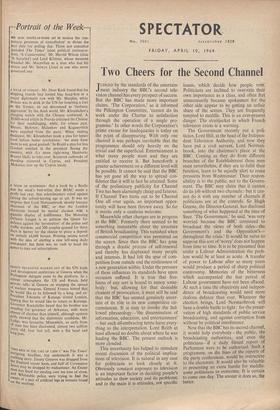Two Cheers for the Second Channel
JUDGED by the standards of the entertain- ment industry the BBC's second tele- vision channel has every prospect of success. But the BBC has made more important claims. 'The Corporation,' so it informed the Pilkington Committee, 'cannot do its work under the Charter to satisfaction through the operation of a single pro- gramme.' In other words the Corporation's prime excuse for inadequacies is today on the point of disappearing. With only one channel it . was perhaps inevitable that the programmes should rely heavily on the trivial and the superficial. Entertainment is what many people want and they are entitled to receive it. But henceforth a greater achievement on a different level will be possible. It cannot be said that the BBC has yet gone all the way to spread con- fidence that it will in fact be attained. Some of the preliminary publicity for Channel Two has been alarmingly cheap and fatuous. If Channel Two turns out to be Channel One all over again, an important oppor- tunity will have been thrown away. So far it merits only a cautious welcome.
Meanwhile other changes are in progress at the BBC. Formerly there seemed to be something immutable about the structure of British broadcasting. This vanished when commercial competition was permitted on the screen. Since then the BBC has gone through a drastic process of self-renewal and thereby has displeased many people and interests. It had felt the spur of com- petition from outside and the restlessness of a new generation within. Under the pressure of these influences its standards have upon occasion suffered. It is true that live- liness of any sort is bound to annoy some- body : but, allowing fdr that desirable element of provocation, it must still be said that the BBC has seemed genuinely uncer- tain of its role in its new competitive cir- cumstances. It is easy to invoke the hal- lowed phraseology—`the dissemination of information, education, and entertainment' —but such all-embracing terms leave every- thing to the interpretation. Lord Reith at least allowed no doubts about where he was leading the BBC. The present outlook is more clouded.
This uncertainty has helped to stimulate recent discussion of the political implica- tions of television. It is natural in any case for politicians to look closely at it. Obviously .constant exposure to television is an important factor in deciding people's attitudes to their society and its problems; and in the main it is attitudes, not specific issues, which decide how people vote. Politicians are inclined to over-rate their own importance as a class, and often fret unnecessarily because spokesmen for the other side appear to be getting an unfair share of the screen. They are frequently. tempted to meddle. This is an ever-present danger. The straitjacket in which French television exists is a warning.
The Government recently put a poli- tician, Lord Hill, at the head of the Indepen- dent Television Authority, and now they have put a civil servant, Lord Norman- brook, into the chairman's place at the BBC. Coming as they do from different branches of the Establishment these men must nevertheless, if they are to fulfil their function, learn to be equally alert to resist pressures from Westminster. Their respon- sibility is to the public, not to the Govern- ment. The BBC may claim that it cannot _ do its job without two channels : but it can- not do it with any number of channels if politicians are at the controls. Sir Hugh Greene, the Director-General, has disclosed something of what happened at the time of Suez. 'The Government,' he said, 'was very worried because the BBC continued to broadcast the views of both sides—the Government's and the Opposition's— throughout the crisis.' It would be naive to' suppose this sort of 'worry' does not happen from time to time. It is to be presumed that under a Labour Administration the prob- lem would be at least as acute. A transfer of power to Labour after so many years would produce a period of sharp political controversy. Memories of the bitterness which accompanied the last period of Labour government have not been effaced. At such a time the objectivity and indepen- dence of broadcasting would need more zealous defence than ever. Whatever the election brings, Lord Normanbrook will have a double battle to fight : for the preser- vation of high standards of public service broadcasting, and against corruption from without by political interference. Now that the BBC has its second channel, it would help everybody—the public, the broadcasting authorities, and even the politicians—if a daily filmed report of Parliament Were. to be authorised. Such a programme, on the lines of the reports of i thq party conferences, would be instructive to the electorate. It would also be valuable in presenting an extra hurdle for meddle- some politicians to overcome. It is certain to come one day. The sooner it does so, the better.






































 Previous page
Previous page